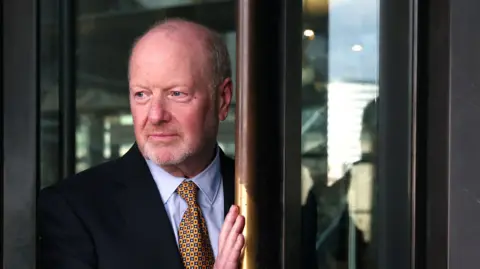In an unfolding situation that has captured the attention of the public and media alike, Sir Alan Bates’s recent assertions regarding the compensation process for sub-postmasters have been firmly rejected. The Horizon Compensation Advisory Board has responded to claims made by Bates, who led the campaign for justice for those wrongfully prosecuted due to the infamous Horizon IT system malfunction. He characterized the compensation negotiations as being akin to a “kangaroo court,” alleging that the process was neither fair nor transparent, and suggested that he had been presented with a “take it or leave it” offer for a sum significantly lower than what he originally sought.
The Horizon IT system, which functioned between 1999 and 2015, led to the wrongful prosecution of more than 900 sub-postmasters, falsely indicating financial discrepancies in their accounts. These serious inaccuracies resulted in many individuals facing criminal charges, financial ruin, and substantial emotional distress. Sir Alan Bates was among a group of 555 sub-postmasters who took part in a landmark legal battle against the Post Office, which ultimately brought to light the failings of this technology and the devastating impact it had had on their lives.
In a piece published in the Sunday Times, Bates expressed his grievances about how the compensation framework was being implemented, claiming it strayed from established standards. He emphasized that many individuals had been waiting for years to receive appropriate recompense for their suffering and alleged that the claims were being dismissed unfairly. His criticisms prompted a detailed rebuttal from the Horizon Compensation Advisory Board.
The board, which includes a mix of parliamentarians and academicians, staunchly defended its process, stating that it had been outlined in consultation with Bates himself. They asserted that the methodology employed for determining compensation included assessments by a qualified judge, thereby ensuring that decisions were made fairly and judiciously. The board explained that the compensation process must eventually reach a conclusion, as it is imperative to bring closure to the many individuals who have endured hardship due to the Horizon scandal.
Bates’s latest offer, according to him, represented only 49.2% of his original claim, raising deep concerns regarding the adequacy of the compensation programs that had been promised to the sub-postmasters. He lamented that the assurances given by the government regarding a straightforward and non-legalistic approach to compensation had apparently been rendered meaningless, suggesting that the complexities of legal frameworks had eroded the initial promises of justice.
In response, the advisory board stated that there was a structured approach to compensation that was designed to provide fairness while recognizing the urgent need to resolve outstanding cases. They also reiterated that Bates had played a critical role in establishing this process, which they believe to be just and well-founded. Their statement aimed to underscore that their objective was ultimately to provide resolution and relief to those impacted by the scandal.
The attention on this case was further amplified by an ITV drama entitled “Mr. Bates vs. The Post Office,” which catapulted the story into the public consciousness, garnering widespread interest in the issues surrounding the injustice faced by sub-postmasters. The government subsequently established a specific compensation fund intended to deliver additional financial support to victims, although the rollout of these funds has been criticized for its sluggish pace.
Under the existing Group Litigation Order (GLO) framework, participants have the option to accept a set compensation amount of £75,000 or pursue their own settlements. Yet, many individuals remain disillusioned with the delays and complications they have faced, and as a result, this situation continues to evoke conversations about justice, accountability, and the mechanisms for ensuring fairness in the remuneration of victims of systemic failures within organizations.



